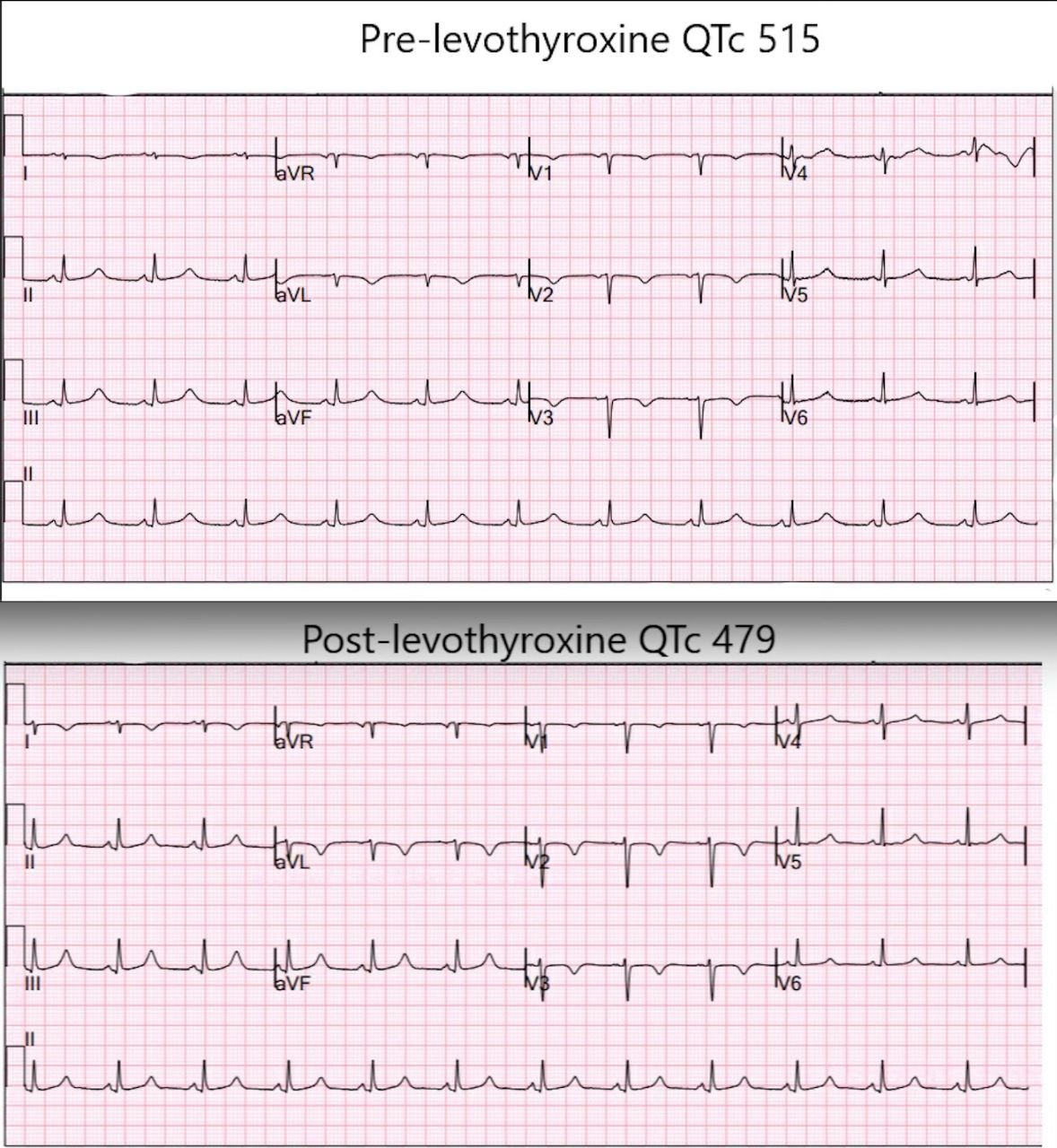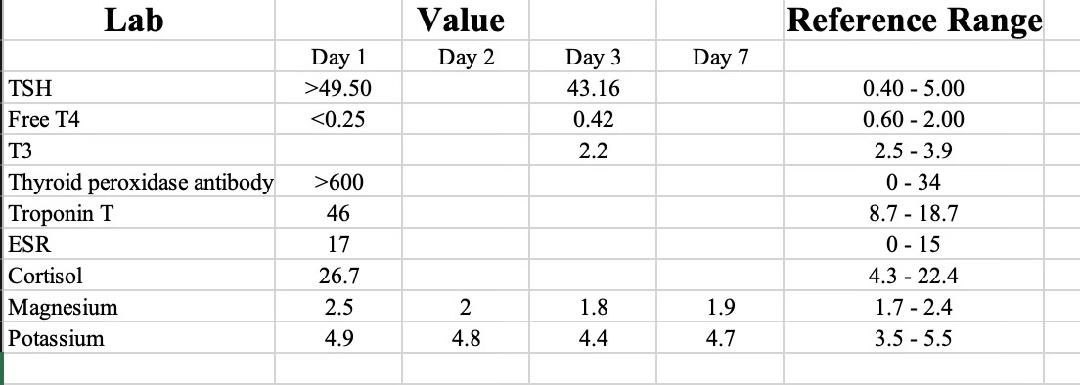Final ID: Sa2132
Hashimoto Thyroiditis and Congenital Long QT Syndrome: A Dangerous Co-morbidity Causing Torsades
Abstract Body (Do not enter title and authors here): Hypothyroidism leads to a prolonged QT interval due to modulation of the potassium channel by low circulating T3, leading to a disproportionate lengthening of the action potential. Patients with Long QT syndromes (LQTS) have an increased risk of symptomatic ventricular arrhythmias and sudden cardiac death (SCD), which can be exacerbated by co-existing hypothyroidism.
Case description:
A 40-year-old female with a previous history of Congenital LQTS, Type 1 diabetes mellitus, anemia, and untreated hypothyroidism was brought to the hospital by EMS with an abrupt onset of palpitations and disorientation following multiple (>30) AICD shocks, with no identifiable triggers. EMS telemetry monitoring in route to the hospital revealed torsades de pointes, following which she received 4g Magnesium Sulfate IV, and reverted to sinus rhythm. ECG in ICU revealed sinus rhythm with prolonged QTc of 515 ms and elevated troponin. The physical exam was unremarkable.
The patient was started on electrolyte replacements and telemetry monitoring. Additional lab testing revealed high TSH with low T4 as seen in Table 1. Her myxedema coma score was markedly elevated at 40 indicating severe hypothyroidism. Thyroid peroxidase antibody was >600 IU/mL indicating Hashimoto's thyroiditis. ECHO showed LVEF is 55–60% with no wall motion abnormalities. Due to elevated troponin, left-heart catheterization was done which showed normal coronaries. The patient was treated with IV hydrocortisone, IV levothyroxine, oral liothyronine, and propranolol, following which she had no more episodes of Torsades, and QTC improved to her baseline of 479 ms. The patient was discharged home with endocrinology and cardiology follow-up.
Discussion:
Hypothyroidism is associated with prolongation of QTc and the risk of ventricular arrhythmias. Assessment of thyroid function is of high value in QT prolongation syndromes to avoid SCD incidence. Urgent electrolyte replacement and levothyroxine replacement therapy are warranted.
Case description:
A 40-year-old female with a previous history of Congenital LQTS, Type 1 diabetes mellitus, anemia, and untreated hypothyroidism was brought to the hospital by EMS with an abrupt onset of palpitations and disorientation following multiple (>30) AICD shocks, with no identifiable triggers. EMS telemetry monitoring in route to the hospital revealed torsades de pointes, following which she received 4g Magnesium Sulfate IV, and reverted to sinus rhythm. ECG in ICU revealed sinus rhythm with prolonged QTc of 515 ms and elevated troponin. The physical exam was unremarkable.
The patient was started on electrolyte replacements and telemetry monitoring. Additional lab testing revealed high TSH with low T4 as seen in Table 1. Her myxedema coma score was markedly elevated at 40 indicating severe hypothyroidism. Thyroid peroxidase antibody was >600 IU/mL indicating Hashimoto's thyroiditis. ECHO showed LVEF is 55–60% with no wall motion abnormalities. Due to elevated troponin, left-heart catheterization was done which showed normal coronaries. The patient was treated with IV hydrocortisone, IV levothyroxine, oral liothyronine, and propranolol, following which she had no more episodes of Torsades, and QTC improved to her baseline of 479 ms. The patient was discharged home with endocrinology and cardiology follow-up.
Discussion:
Hypothyroidism is associated with prolongation of QTc and the risk of ventricular arrhythmias. Assessment of thyroid function is of high value in QT prolongation syndromes to avoid SCD incidence. Urgent electrolyte replacement and levothyroxine replacement therapy are warranted.
More abstracts on this topic:
Bridge from Arrest to Recovery: Sudden Cardiac Arrest in a Young Patient with Concomitant Myocardial Bridge and Hypertrophic Cardiomyopathy
Iqbal Fatima, Khan Muhammad Jafar, Charitakis Konstantinos
All-cause mortality for Patients with Preserved Ejection Fraction Heart Failure stratified by B-blocker Therapy and Presence of Permanent Pacemaker.Leavitt Jonas, Cunn Gregory, Coleman Kristie, Ahmad Sana, Bekiaridou Alexandra, Gasparis Christopher, Fishbein Joanna, Mountantonakis Stavros


